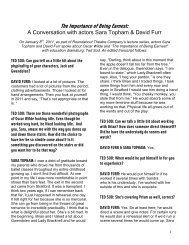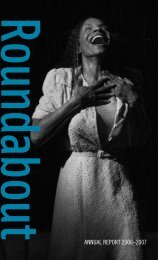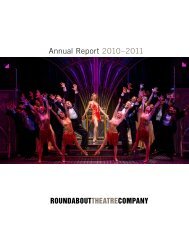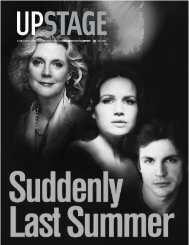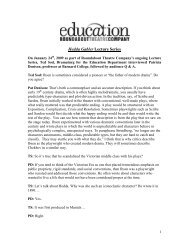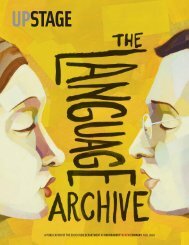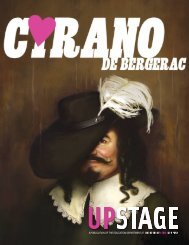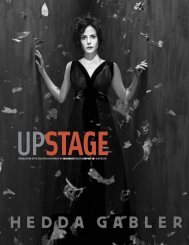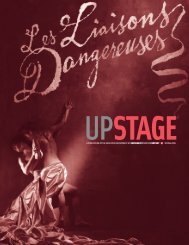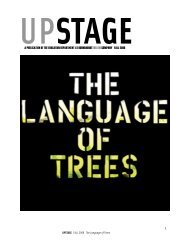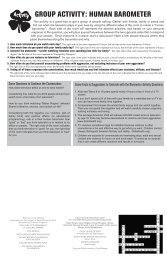Emma Rice Lecture Series - Roundabout Theatre Company
Emma Rice Lecture Series - Roundabout Theatre Company
Emma Rice Lecture Series - Roundabout Theatre Company
Create successful ePaper yourself
Turn your PDF publications into a flip-book with our unique Google optimized e-Paper software.
Brief Encounter:<br />
A Conversation with Director <strong>Emma</strong> <strong>Rice</strong><br />
On November 27 th , 2010 as part of <strong>Roundabout</strong> <strong>Theatre</strong> <strong>Company</strong>’s lecture<br />
series, Director <strong>Emma</strong> <strong>Rice</strong> spoke about “Brief Encounter” with Dramaturge Ted<br />
Sod. An edited transcript follows:<br />
TED SOD: Tell us a little bit about<br />
where you were born and how you<br />
became a woman of the theatre.<br />
EMMA RICE: I was born in Nottingham<br />
which, for anybody who doesn’t<br />
know England, is right smack dab in<br />
the middle. I had a very happy<br />
childhood. I always thought I wanted<br />
to be an actor because at the time,<br />
there was a regional theatre in<br />
Nottingham which was run<br />
throughout my childhood by Richard<br />
Eyre, the great, British director. My<br />
parents, who weren’t theatre people<br />
at all, started going to the theatre<br />
because there was such great work<br />
happening with actors like Jonathan<br />
Pryce. I fell in love with the theatre at<br />
that time. I loved the event of it. I<br />
loved putting on a pretty dress and<br />
having a magical evening. I still<br />
enjoy that to this day.<br />
I came to be an actress and I did<br />
okay; rather than well. I started to<br />
experiment and I met some very<br />
interesting theatre makers. I began<br />
to develop as much more of a<br />
devising actor rather than a<br />
traditional actor. I went to Poland<br />
and worked with the Gardzienice<br />
<strong>Theatre</strong> Association. I learned lots of<br />
physical skills and musical skills.<br />
When I eventually turned my hand to<br />
directing, which was a very slow and<br />
natural process, I had a lot of things<br />
in my tool kit from the very diverse<br />
career I had as an actress.<br />
TED SOD: When you joined Kneehigh,<br />
where you developed Brief Encounter,<br />
it was as an actress, correct?<br />
EMMA RICE: Absolutely.<br />
TED SOD: Your training before the<br />
Poland training was at the Guildhall<br />
School and that was a traditional<br />
emphasis on the classics.<br />
EMMA RICE: Absolutely. The Guildhall<br />
was very classical, verse and text<br />
based training.<br />
TED SOD: Can you talk about the<br />
aesthetic of Kneehigh and how this<br />
show came about? It is a rich story.<br />
You went in for a meeting as I<br />
understand it and this play was pretty<br />
much a fortuitous accident.<br />
EMMA RICE: It’s hard to know where<br />
the story begins. I started working for<br />
Kneehigh in 1994 as an actor and I<br />
fell in love. It was absolutely love at<br />
first sight and first meeting. Kneehigh<br />
are based on the West Peninsula of<br />
England, which is a long way from<br />
London, in a barn on the cliff top.<br />
Kneehigh had been going for 30<br />
1
years and when I joined in 1994 they<br />
were going for 15 years. It was a<br />
maverick, sexy, musical, funny band<br />
of Brigands. I think there was a great<br />
chemistry between us. It was<br />
intoxicating. A lot of our work was<br />
performed outdoors because there<br />
were no theatres in Cornwall. There<br />
is one there now that is eight years<br />
old, but for the early years of<br />
Kneehigh, we worked on beaches,<br />
cliff tops, car parks and arsenic<br />
wastes. It was very eventful and it<br />
was fabulous. It meant that<br />
we had to be visual.<br />
There’s no point in doing a<br />
great, long play outdoors.<br />
People can’t hear us if it’s<br />
windy or they don’t want to<br />
sit for three hours if it’s wet.<br />
The work becomes very<br />
robust and physical. The<br />
storytelling has to be very,<br />
very clear and you also<br />
have to work clearly as a<br />
company. For example, on<br />
a beautiful stage like this, if<br />
you want someone in the<br />
audience to look<br />
somewhere, you throw light<br />
on them. If it’s daylight, you simply<br />
can’t do it. You have to have the<br />
whole of the company of actors go,<br />
“This is about them there.” You end<br />
up making clear storytelling. I think<br />
you can tell in Brief Encounter that<br />
we are still doing that till this day. It is<br />
clear how the ensemble throws the<br />
focus around the room and it is not<br />
done through technology. The<br />
technology adds to it, but, in fact, the<br />
team of people is telling a physical<br />
story all the way through.<br />
We have a loyal, large following in<br />
Cornwall. Then people in London<br />
“For the early<br />
years of<br />
Kneehigh, we<br />
worked on<br />
beaches, cliff<br />
tops, car parks<br />
and arsenic<br />
wastes. It was<br />
very eventful<br />
and it was<br />
fabulous.”<br />
began to notice that our work was<br />
interesting and that we were being<br />
well received internationally as well. I<br />
started being courted by a fabulous,<br />
wonderful producer called David<br />
Pugh. I started getting flowers and<br />
that’s never actually happened to me<br />
in my life, so I was very excited. He<br />
basically said, “Come to my office. I<br />
have a proposition for you.” I<br />
remember walking down the road to<br />
the side entrance of his office and<br />
remember thinking, “Whatever this<br />
man suggests, say no.” I<br />
thought, “You run a company,<br />
you’ve got things that are very<br />
important to you and you<br />
mustn’t be tempted by the<br />
commercial world. Say no.” So<br />
I went into his office and he<br />
hands me a package; I’m liking<br />
this but say no <strong>Emma</strong>, say no.<br />
So I opened up the package<br />
and there is a beautiful first<br />
edition of Peter Pan. He says,<br />
“<strong>Emma</strong>, I think you’d be<br />
fantastic. Would you like to do<br />
it?” I think - it’s not a bad idea<br />
because who doesn’t love<br />
Peter Pan? I also loved that<br />
one of the first, early drafts J.M.<br />
Barrie did of Peter Pan was called,<br />
The Boy Who Hated Mothers. We<br />
talked a little bit about that. I said to<br />
David, “It’s a great idea but it’s not<br />
really close to my heart and it’s not<br />
what I want to do at the moment.<br />
Thank you so much but I’ve got to<br />
say no.” He said, “Okay. Well, thank<br />
you.” We got up, I was going to give<br />
him a hug goodbye and my eyes just<br />
glanced on top of his television<br />
which had some DVD’s above it and<br />
I saw the title of Brief Encounter in a<br />
flicker of a second. I said, “Now if<br />
you would have suggested Brief<br />
2
Encounter today, it would have been<br />
a really different conversation.” He<br />
said, “Wanna do it?” and I said,<br />
“Yeah.” Genuinely, that is the end of<br />
it. I stumbled out into the street and<br />
said, “How did that happen?”<br />
I love that story partly because it’s<br />
true, but partly because it was<br />
something that I hold very dear in my<br />
creative life which is that it was a<br />
moment of genuine instinct. Very few<br />
things happen by accident.<br />
TED SOD: The film version of Brief<br />
Encounter has a fascinating history.<br />
It’s the most seminal film in Britain<br />
isn’t it?<br />
EMMA RICE: It’s certainly one of<br />
them. It’s a film that everyone knows<br />
about, knows of and can do an<br />
impression of even if they haven’t<br />
seen it. I’d like to think of it as being<br />
in our DNA. It’s quite a tragic film. I<br />
generally can’t remember the first<br />
time I saw it and I did see it. My<br />
guess is I saw it when I was home<br />
from school one day feeling sick or<br />
some rainy Sunday afternoon.<br />
TED SOD: What is it in your soul that<br />
made you want to do this fantastic<br />
work based on that film?<br />
EMMA RICE: All I know is that the<br />
story means something to me which<br />
goes back to that moment of instinct.<br />
It’s almost the essential human<br />
condition which is to feel love, to feel<br />
care and then to have to make<br />
choices around that incredibly<br />
intense emotion. I find it impossible<br />
to believe that there are many adults<br />
who haven’t experienced at least<br />
one part of this story; either the love<br />
of somebody you can’t have or<br />
someone you love loving somebody<br />
else. It’s a very adult, very universal<br />
and global story. What drew me to it<br />
is that I’ve certainly been there. I live<br />
the life of an artist and work with<br />
some amazing people. I’m a fool for<br />
love. I fall in love too often. That<br />
makes it sound like it’s cheap but it’s<br />
not. I love people, I’m excited by<br />
people and I have been put into very<br />
real and dark trouble in my life.<br />
Therefore, this film absolutely is<br />
relevant. It’s not because I wanted to<br />
make an amazing piece of theatre –<br />
that’s the byproduct. The seed of it is<br />
that I know what the characters went<br />
through. I don’t know of any of us<br />
that don’t recognize those emotions<br />
and the struggle they are going<br />
through. That’s why we’re so moved<br />
by it.<br />
TED SOD: It’s a remarkable piece of<br />
theatre because it uses so much:<br />
music, film, text, dance. But you<br />
didn’t set out to do that, did you? Tell<br />
us about diving into this. What was it<br />
like?<br />
EMMA RICE: I don’t dive in. That’s the<br />
first thing I don’t do. I circle for a very<br />
long time. I know why I want to tell it<br />
and I know how I feel about it. The<br />
interesting thing is what I don’t know.<br />
I spend a long time working around<br />
the perimeters of an idea because of<br />
my background and because of what<br />
I believe about theatre. I don’t wish<br />
to make a perfect version of the play;<br />
get someone else to do that. I’m<br />
absolutely interested in how I can<br />
explode, expand and explore the<br />
3
material for a new audience. I do see<br />
myself more as a storyteller. If I have<br />
to describe what I do, I’m a<br />
storyteller. I happen to use theatre at<br />
this moment in my life, but I love to<br />
tell stories. People have told stories<br />
throughout history so I don’t feel<br />
reverence towards them.<br />
I first started listening to Noel<br />
Coward’s music. Now that guy can<br />
write a tune. He is amazing and he<br />
can also write a wonderful lyric. “If<br />
love is all I would be lonely” is a<br />
heartbreaking lyric. He also wrote<br />
bawdy songs like,<br />
“Alice is at it Again,<br />
“or “A Bar on the<br />
Piccolla Marina”. I<br />
very much enjoyed<br />
exploring those. Then<br />
I went on to another<br />
wonder of Noel<br />
Coward. That was his<br />
poetry which I didn’t<br />
even know he wrote.<br />
You discover truly<br />
phenomenal pieces of<br />
work like “I Am No<br />
Good at Love” that<br />
reads “I betray it with<br />
little sins; For I feel the misery of the<br />
I first started<br />
listening to Noel<br />
Coward’s music. Now<br />
that guy can write a<br />
tune. He is amazing<br />
and he can also write<br />
a wonderful lyric. “If<br />
love is all I would be<br />
lonely” is a<br />
heartbreaking lyric.<br />
end in the moment that it begins; and<br />
the bitterness of the last goodbye is<br />
the bitterness that wins.” What an<br />
extraordinary treasure to find when<br />
working on a show like this.<br />
That is where the idea of this<br />
happened, where you think, “This<br />
can’t just be putting this film on<br />
stage.” It has to be a patchwork, a<br />
collage or mash-up, as we call it, of<br />
Noel Coward; of all the facets of that<br />
man’s story where obviously he saw<br />
great wit and great romance in life.<br />
But he also saw great sacrifice and<br />
great denial. We can only imagine<br />
what it was like to be a homosexual<br />
in the ‘30s. Yet, his spirit soars and<br />
transcends. “A Room with a View”,<br />
seems like an absolute prayer to just<br />
being left in peace and to be simple.<br />
It’s prayer for compassion. So once<br />
you’ve discovered that trail of<br />
humanity, that’s when you start<br />
shaping.<br />
TED SOD: Tell us about how you<br />
worked with Stuart Barker, the<br />
composer, and how you work<br />
with actors? Is each actor a<br />
different riddle for you?<br />
EMMA RICE: Oh they’re all the<br />
same.<br />
TED SOD: There’s one sitting<br />
right over there.<br />
EMMA RICE: I have to qualify<br />
my cheeky remark. Of course<br />
actors aren’t the same but I<br />
actually do think that people<br />
are very similar. I think that<br />
we might react differently to human<br />
conditions, but actually we feel very<br />
similar emotions. I think a lot of us<br />
feel fear a lot of the time and I think<br />
particularly those of us that work in<br />
theatre feel fear because it’s<br />
terrifying. Actors have to stand up<br />
here and display a whole host of<br />
various skills, actions all at the same<br />
time and hope that you will like them.<br />
It’s an incredibly vulnerable thing for<br />
them to do. I think most of us are<br />
pretty frightened most of the time.<br />
We’re frightened that we will be<br />
found out, won’t be good enough or<br />
4
that we’ll be rejected. As a team<br />
leader, really I do treat most people<br />
in the same way as I would wish to<br />
be treated. I try to remove fear.<br />
I work with people because they’re<br />
brilliant and try never to question<br />
that. I don’t question that. Really my<br />
job is to get that brilliance out, use it<br />
and be a detective of the humanity<br />
that is around me.<br />
TED SOD: Let’s talk about your<br />
rehearsal process with actors.<br />
EMMA RICE: There’s lots of<br />
conversation and there’s lots of play.<br />
These guys, till this day, play games<br />
before every show. It gets you in the<br />
room, gets you with each other and<br />
gets lightness in the air. It reminds<br />
you that you don’t have to impress<br />
anybody; that it’s actually about the<br />
collective involvement. The process<br />
unfolds with every collaboration in<br />
the same way. We talk about the<br />
work, about why we’re doing it and<br />
what it means. Obviously I’m leading<br />
in some ways by saying, “I want it to<br />
be this, “or “I want it be surprising or<br />
funny or quirky.” Then magic<br />
happens. If I’ve done my job well, the<br />
collective imagination kicks in. If we<br />
talk enough and if we play enough<br />
and keep going to the heart of<br />
things, tunes emerge or ideas<br />
emerge or colors emerge. What<br />
happens is that the wider pool of<br />
people start having great ideas. It is<br />
quite rare that someone has an idea<br />
that isn’t right or indeed doesn’t lead<br />
to another good idea. If people aren’t<br />
fearful, they will be brilliant.<br />
TED SOD: I know some of the songs<br />
have music and lyrics by the master,<br />
Noel Coward; but Stu Barker set music<br />
to some of the words. Were you clear<br />
on what some of that music should<br />
be?<br />
EMMA RICE: I pieced together the<br />
rough structure of the songs, lyrics<br />
and poems. If Noel Coward had<br />
written a piece of music, we had to<br />
use it. That was a really good<br />
starting point. “Mad About the Boy”<br />
wasn’t going to have a different tune.<br />
What that meant for Stu was that any<br />
original music created needed to<br />
harmonize with Noel Coward. I think<br />
that was a brilliant boundary for us to<br />
work in. Stu and I had worked<br />
together all our creative lives really<br />
and we met at Kneehigh fifteen<br />
years ago. Stu was what we would<br />
call in England a ‘hippie’. He was<br />
completely untrained as a musician.<br />
Till this day he really isn’t fluent in<br />
reading or writing music but he is the<br />
best musician I have ever met. He<br />
has folk and blues in his soul, as I<br />
hope I do, and is constantly<br />
surprising. The song at the end of<br />
the act which bookends the show,<br />
“This can’t last. This misery can’t<br />
last,” I took from Laura’s voiceover in<br />
the film and put into lyrics. I said to<br />
Stu, “I want something that has the<br />
feel of a Russian choir,” which was<br />
to honor the use of Rachmaninov<br />
from the film and also said, “Give me<br />
something really unashamedly<br />
emotional.” For “The Wide Lagoon”<br />
which is right in the center I said, “I<br />
want this to be about freedom and<br />
sex. Go write some blues or<br />
something that makes us all feel like<br />
these people are actually on the<br />
edge of unbuttoning themselves and<br />
feeling the emotions.”<br />
5
TED SOD: And there’s an underscoring<br />
that happens throughout too which he<br />
composed, correct?<br />
EMMA RICE: Yes.<br />
TED SOD: So he composed all of that<br />
in the flavor of Rachmaninov would<br />
you say?<br />
like for an eternity; not in a terrible<br />
way. What you’ve seen tonight is<br />
years of care. Sometimes I have to<br />
pinch myself but it rarely happens in<br />
the moment. A lot of people have<br />
made deep decisions and plans to<br />
bring this show this far.<br />
TED SOD: What qualities from the<br />
actors make you think, “He or she has<br />
got to be a part of us!”?<br />
EMMA RICE: I think everything is<br />
referenced. We’re not<br />
terribly analytical by choice<br />
because if you analyze too<br />
much you tend to argue<br />
yourself out of anything. It’s<br />
much better to say yes,<br />
yes, yes. So I can’t say it’s<br />
not influenced by<br />
Rachmaninov but it<br />
certainly wasn’t a decision<br />
to be.<br />
TED SOD: Has it been<br />
shocking to you that this<br />
production started at<br />
Kneehigh, went to the West<br />
End, toured all over the<br />
U.K., came to the U.S. and now is on<br />
Broadway or did you sense that this<br />
was the little show that could?<br />
“I always say I’m<br />
not looking for the<br />
best actors in the<br />
world, which<br />
sounds derogatory<br />
to my brilliant<br />
team, but actually<br />
it’s the<br />
personalities, the<br />
people and it’s the<br />
spirit.”<br />
EMMA RICE: It’s impossible to<br />
describe. It’s like dating.<br />
You know very quickly.<br />
Interviewing is a strange<br />
thing for me because I was<br />
an actor as well; so I am<br />
sort of desperate for it all to<br />
work out. It’s really a<br />
chemistry thing. I always<br />
say I’m not looking for the<br />
best actors in the world,<br />
which sounds derogatory to<br />
my brilliant team, but<br />
actually it’s the<br />
personalities, the people<br />
and it’s the spirit. It means<br />
that I will often take a punt<br />
on somebody.<br />
TED SOD: Remarkable because some of<br />
them have this facility to do whatever<br />
you ask them to do.<br />
EMMA RICE: Well, it had a<br />
commercial producer at its start and<br />
it’s a big title. Without the help of<br />
David Pugh, Kneehigh probably<br />
would have never got permission to<br />
work on this property. There was<br />
always this sense that this show may<br />
be commercial. Nothing has ever felt<br />
like a surprise is the reality. It’s<br />
called Brief Encounter and it has felt<br />
EMMA RICE: Most of us do have that<br />
facility. I would argue that most of us<br />
are capable of most things. Now,<br />
obviously we have dedicated<br />
musicians who are very skilled<br />
people but most people can pick up<br />
an instrument and learn something if<br />
they wish it. A company like this has<br />
such a spirit of generosity and<br />
humanity that the band was set up<br />
6
for two people and suddenly I’ve got<br />
half the cast on stage because they<br />
all bought ukuleles. That is wonderful<br />
because people aren’t wondering<br />
when their next line is or their cue.<br />
They’re actually wanting to be<br />
involved in telling the story. It’s the<br />
spirit I look for.<br />
TED SOD: Before we let people ask you<br />
questions, could you tell us about the<br />
difference between British and<br />
American audiences?<br />
EMMA RICE: I would say that the New<br />
York audience is similar to the<br />
London audience. You take a little bit<br />
of time to decide whether it’s funny<br />
or whether you’re going to go with it<br />
or not. Then you really come on<br />
board, listen and enjoy the mix of the<br />
comedy and the tragedy. The<br />
exception to the response to it was in<br />
San Francisco where they fell in love<br />
with it from the second it started.<br />
They never had to warm up and had<br />
an immediate reaction.<br />
TED SOD: Now it’s time to turn it over<br />
to the audience’s questions.<br />
Audience Question #1: Thanks for the<br />
wonderful performance. How do you<br />
keep the elements of comedy and<br />
pathos in the production balanced?<br />
EMMA RICE: We work constantly on it<br />
and we feedback to each other on it.<br />
The audience has actually been able<br />
to tell us where the line is.<br />
Sometimes a line gets a laugh that<br />
we really don’t want. Then we talk<br />
about why that could be. In terms of<br />
how we make the work, it was never,<br />
ever going to be a parody and<br />
therefore that’s never come into the<br />
rehearsal room. We really fine tune it<br />
and discuss whether a head is<br />
turned or whether there is another<br />
character stirring a teacup at the<br />
wrong time. It’s really the fine tuning<br />
of that high drama. I think it’s the<br />
high drama that we find difficult and I<br />
think there’s lots of embarrassment<br />
because somebody saying, “I want<br />
to die,” is quite hard to hear. We<br />
really have to train the audience to<br />
be able to hear that and feel that as<br />
well.<br />
TED SOD: Alec and Laura for me play it<br />
very earnestly and straight. You knew<br />
that from the beginning?<br />
EMMA RICE: Absolutely. There would<br />
be no point in doing this story without<br />
absolutely throwing our hearts and<br />
souls into it which is what we’ve<br />
always done.<br />
Audience Question #2: This play had a<br />
lot of movement in it that should be<br />
labeled dancing. I was wondering if<br />
you call it choreography?<br />
EMMA RICE: Well, I am the<br />
choreographer for the piece as I was<br />
a choreographer for awhile. I think<br />
my work is very choreographically<br />
bent. I take that as a huge<br />
compliment, what you’ve said,<br />
because the dance of the piece has<br />
as much meaning as the words. The<br />
dance of it has been very chosen.<br />
Thank you for that comment as the<br />
choreography has been carefully<br />
devised by me and the actors<br />
together.<br />
7
TED SOD: Could you tell us about the<br />
inspiration for hanging from the<br />
chandeliers?<br />
EMMA RICE: I really wanted there to<br />
be moments in the piece which<br />
aren’t in the film which are moments<br />
of joy - where we actually feel joy,<br />
and we feel love and we feel color.<br />
This was the moment when they’re<br />
drinking champagne which is so<br />
naughty. I always knew I wanted that<br />
moment to feel very romantic in<br />
order to really feel the painful loss at<br />
the end. I’ve always been influenced<br />
by Chagall and the romance of the<br />
weightlessness of lovers. We always<br />
said it was the Chagall moment and<br />
have called it that since the<br />
beginning of devising. That’s what<br />
happened. We got two chandeliers<br />
and mucked around on them. It<br />
keeps changing. It used to be one<br />
chandelier and we’ve managed to<br />
get two. That’s Broadway.<br />
Audience Question #3: I read in the<br />
Playbill that the film is based on<br />
Coward’s play Still Life and was<br />
wondering what changes were made to<br />
the material for the movie. Did you<br />
start with the movie or the play? How<br />
did that work?<br />
EMMA RICE: Well this is an<br />
adaptation of the two together. I<br />
have the rights to the screenplay and<br />
the play Still Life. I was knocked out<br />
by Still Life which is five scenes and<br />
they’re all in the tea room. There’s<br />
no other location. We just see the<br />
lovers on their five meetings. It’s a<br />
much richer piece for the three<br />
couples. The other characters are<br />
more carefully drawn in Still Life. I<br />
really took that as my starting point<br />
because I really wanted to enjoy that<br />
broader sense of humanity. Then I<br />
sort of cut and pasted it with the film<br />
the bits I didn’t want to lose.<br />
Audience Question #4: What is the<br />
first thing you do in the room when<br />
you are devising the product?<br />
EMMA RICE: We play games. We<br />
have big sheets of paper for<br />
brainstorming and always sing.<br />
When we’re in Cornwall, we try and<br />
go out on the cliffs and sing. I really<br />
try and create a day where people<br />
aren’t feeling under pressure. We<br />
play volleyball. Playing ball is a<br />
brilliant thing because it’s about<br />
something else. It’s not about you; is<br />
my body good, is face good, is my<br />
voice good? It’s about can you keep<br />
that ball in the air and can you work<br />
as a team. The one thing we never<br />
do is read a script. We tell each<br />
other stories, we sing songs, we<br />
think about color, we think about<br />
ideas and we eat. It’s a really big<br />
part of the day to have good food at<br />
the center of the day. We tend to<br />
have a bottle of wine as well.<br />
Audience Question #5: We saw this<br />
production at the St. Anne’s<br />
Warehouse last year. Here we are<br />
seeing it again and it is stunning,<br />
stunning, stunning. When you go on<br />
tour again, will there be changes to<br />
the next production?<br />
EMMA RICE: Well, I can hardly make<br />
myself say this, but there are no<br />
8
plans for Brief Encounter to have a<br />
life after it closes on the 2 nd of<br />
January. I’ve just seen it for possibly<br />
the last time; so I found today very<br />
emotional myself. Who knows what<br />
will happen to Brief Encounter, if<br />
anything, but luckily Broadway and<br />
Studio 54 has been a pretty<br />
remarkable place to end.<br />
Audience Question #6: What are you<br />
working on next?<br />
EMMA RICE: The next thing I’m going<br />
to direct is a version of Umbrellas of<br />
Cherbourg early next year that I’m<br />
very excited about. Somebody said<br />
to me yesterday, “It’s too dark. It’s<br />
too dark for Americans,” and I’m<br />
thinking, “No, it’s not.”<br />
TED SOD: We hope you’ll be able to<br />
bring us Umbrellas, another exquisite<br />
romance.<br />
EMMA RICE: I do too.<br />
9



